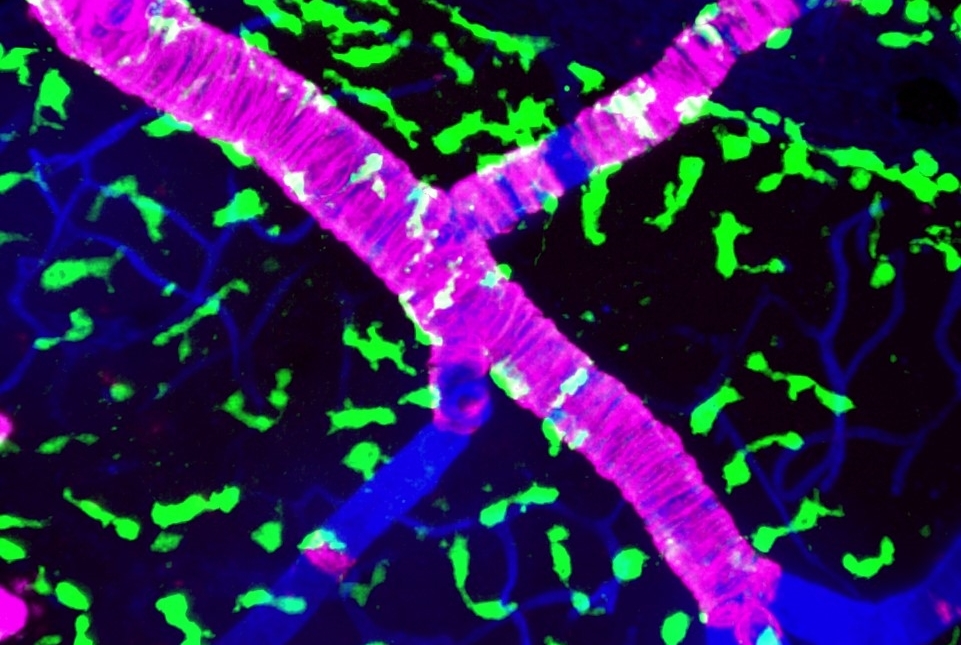
Researchers at Weill Cornell Medicine have demonstrated how amyloid beta, a peptide associated with Alzheimer’s disease, can interact with a protein receptor on immune cells in the brain triggering a reaction that damages blood vessels and leads to neurodegeneration.
The findings, published in Molecular Neurodegeneration on Oct. 3, may help researchers understand how dementia develops in diseases such as Alzheimer's and cerebral amyloid angiopathy (CAA), which often coexist, and discover much-needed treatments.
Amyloid beta is a normal peptide byproduct of brain function, but in CAA and Alzheimer's, these small molecules build up and damage the walls of blood vessels in the brain. The injured arteries can cause brain bleeds and contribute to cognitive impairment, but the mechanism of how this happens has been unknown.
Untangling Amyloid Buildup
Previous studies have shown border-associated macrophages—immune cells that surround blood vessels in the brain— have CD36 receptors on their surface that can bind to amyloid beta. It turns out that amyloid beta activates CD36 triggering the release of oxygen free radicals which damage arterial walls and suppress necessary blood flow in the brain.

Dr. Constantino Iadecoloa
“The brain normally removes amyloid beta very efficiently because our blood vessels help pump it out of the brain to stay healthy. But, we found when amyloid beta accumulates, it ‘tickles’ border-associated macrophages, which release large amounts of toxic free radicals,” said study senior author Dr. Costantino Iadecola, director and chair of the Feil Family Brain and Mind Research Institute and the Anne Parrish Titzell Professor of Neurology at Weill Cornell Medicicine.
The researchers found that the free radicals paralyze the brain’s blood vessels on contact. “Amyloid then accumulates in the smooth muscle of the vessel walls, which blocks the vessel’s ability to pump out amyloid,” Dr. Iadecola explained. “CAA and cognitive impairment are the unfortunate result.”
The study team also included co-corresponding author Dr. Laibaik Park, associate professor of neuroscience at the Feil Family Brain and Mind Research Institute and first author Dr. Ken Uekawa, who was a visiting fellow at Weill Cornell Medicine during this research.
Eliminating CD36 Rescues Damage and Cognitive Function
Starting with a preclinical model of Alzheimer’s disease with CAA and cognitive impairment, the researchers deleted CD36 in the border-associated macrophages. “We showed that eliminating CD36 receptors in border-associated macrophages improved vascular function and reduced amyloid beta accumulation around blood vessels. Most importantly, the cognitive function of the mice improved,” said Dr. Park. The researchers also found that without CD36, the macrophages produced less reactive oxygen radicals.

Dr. Laibaik Park
These findings demonstrate a new role for border-associated macrophages in cognitive decline: amyloid beta induces production of oxygen free radicals, which damages arteries, causes beta amyloid deposits in the arterial walls and cognitive decline. Dr. Iadecola and his colleagues concluded that deleting CD36 in border associated macrophages suppressed oxidative stress, improved neurovascular function and promoted amyloid beta clearance out of the brain, so it didn’t injure arteries.
Therefore, targeting CD36 in border-associated macrophages may benefit CAA and other conditions associated with vascular amyloid accumulation. The researchers speculate that this finding may help find a treatment for amyloid-related imaging abnormalities (ARIA). This is a potentially serious reaction to monoclonal antibody drugs, like aducanumab, used to treat patients with mild cognitive impairment and Alzheimer's disease. In a large proportion of patients receiving this amyloid beta immunotherapy at the highest dose, MRIs show that brain edema or hemorrhages occurred since starting treatment. Currently, these patients must discontinue the drug, but counteracting ARIA may enhance the success of amyloid beta immunotherapy.
“After completing our translational work in the coming years, we hope to determine if blocking CD36 in brain macrophages or otherwise manipulating them could eliminate abnormal accumulations of amyloid beta in patients treated with amyloid beta immunotherapy,” Dr. Iadecola said.
Many Weill Cornell Medicine physicians and scientists maintain relationships and collaborate with external organizations to foster scientific innovation and provide expert guidance. The institution makes these disclosures public to ensure transparency. For this information, see the profile for Dr. Costantino Iadecola.
This research was supported by the National Institutes of Health grants R01-NS37853 and R01-NS097805.
